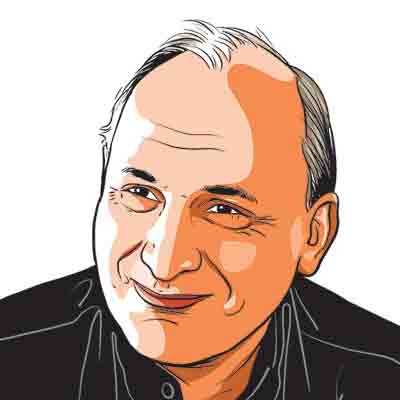Opinion A man of consensus
Hassan Rohanis election could bring back a spirit of openness to Irans foreign policy,and ease its domestic decline
Hassan Rohanis election could bring back a spirit of openness to Irans foreign policy,and ease its domestic decline
The presidential election of June 14 in Iran turned out to be against all expectations a peaceful and surprising event. The election of Hassan Rohani,a mild-mannered cleric,as the eleventh president of the Islamic Republic of Iran has generated a lot of hope. The lack of consensus among hardliners made victory much easier for Rohani,as also the withdrawal of the reformist candidate Mohammad Reza Aref. As such,Rohani became the only non-conservative candidate to talk about the improvement of economic conditions and the defence of civil liberties. In fact,the Iranian presidential election became a sort of nonviolent movement against conservatism in Iranian politics,and also a public referendum on issues such as inflation,unemployment,relations with the West and,more specifically,on the Iranian nuclear programme and sanctions related to it.
It is interesting to point out that,less than two weeks before the election,Western journalists and politicians were wondering whether the presidential election would have an essential impact on the Islamic Republics nuclear programme. Today,the short answer would be: Yes. As a committed supporter of Irans nuclear programme,but at the same time as a severe critic of the mistakes made by subsequent Iranian negotiating teams,Hassan Rohani is the best candidate for the job. Rohani has a good university background and he is the author of seven books,the latest,published in 2011,being National Security and Nuclear Diplomacy.
One should not forget that during Rohanis tenure as chief negotiator for Irans nuclear programme under president Mohammad Khatami,Irans position was carefully worked out by him through consultations with all key players in Iranian politics. In other words,Rohani appears to many observers as a man of consensus,and not as a passive actor waiting for dialogue to emerge. That is to say,unlike Saeed Jalili who,over the past six years,led Irans nuclear plans to a dead-end,Rohani has always been in favour of reducing tension with Western countries and preventing sanctions against Iran. As such,Rohanis election promises a solution to Irans nuclear negotiations and the Iranian peoples need for relaxing the sanctions.
But what makes Rohanis election even more surprising is that,unlike all the other approved candidates,he is not considered close to Irans Supreme Leader. The general impression before Rohanis election as president was that Ayatollah Khamenei supported either Saeed Jalili or Mohammad Baqer Qalibaf. Whether the Supreme Leader changed his mind or simply let popular opinion prevail in Iran,it is certain that the election of Hassan Rohani could serve his moves towards calming the tensions in Iran while relieving the people of the political disillusionment and disenchantment created during the last eight years,and especially since the rigged presidential election in 2009. More important,the election of Rohani brings back a spirit of openness to Irans foreign policy. At the same time,it sends a positive message of dialogue and friendship to the international community and especially to the five permanent members of the UN Security Council as well as Germany,in order to help reintegrate Iran into the global community and withdraw some of the toughest sanctions imposed on the Iranian economy.
Therefore,as it appears,Rohanis election is supposed to decrease tensions between Iran and the outside world rather than create new international challenges. This means Rohani will definitely inject a new tone of moderation in Irans foreign policy,and more precisely with regard to the tensions in the Middle East. But the inclusion of Rohanis government as part of a compromise solution in Syria depends on many factors. Among these,two are the most important. First,Rohani will have to come to terms with Khamenei,a conservative-controlled Parliament and the powerful fist of the Islamic Revolutionary Guard Corps. Second,he should establish better relations with Saudi Arabia and Qatar,while indirectly helping the Obama administration in deflecting hawks,neo-conservatives and the Israel lobby in Washington DC.
It is true that Hassan Rohani has never crossed any of the Iranian establishments red lines as an official who has held top posts in the Islamic Republic. He even condemned the post-election protests of June 2009 as a move by those who had been fooled. And yet,his call to end Irans international isolation can serve as a bridge between the supporters of the Supreme Leader and the reformists. In the meantime,the full support provided to Rohani by two former presidents,Akbar Hashemi Rafsanjani and Mohammad Khatami,will play a crucial part in determining the future distribution of political power in the Islamic Republic. In fact,much of Rohanis challenge would be to maintain the balance between different pressure groups and to prevent any one group from becoming strong enough to challenge him.
In this scenario,a successful outcome from the talks with the Americans and Europeans could play a significant role. But Rohani would also need to keep up the spirits of his Iranian supporters by waging an uphill battle against mismanagement,corruption and the violation of human rights,which have all contributed to the decline of Iranian diplomacy. It is true that nobody expects a sudden reversal in Irans domestic policy or its stance towards the West. But it goes without saying that the election of Rohani may offer Ayatollah Khamenei,the Basij and the Revolutionary Guards an opportunity to ease the country out of eight years of political decline and international embarrassment caused by Mahmoud Ahmadinejads intemperate rule.
The writer is Noor-York Chair
in Islamic Studies,
York University,Toronto





